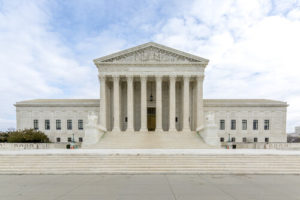DOJ Affirms its Materiality Provision but Threatens to Dismiss Gilead FCA Case

On November 30, 2018, the United States filed its amicus curiae brief before the Supreme Court in Gilead Sciences, Inc. v. United States ex rel. Campie (“Gilead”). The brief highlights two key topics in False Claims Act (“FCA”) litigation: (1) the interpretation of materiality under Universal Health Services, Inc. v. United States ex rel. Escobar, 136 S. Ct. 19889 (2016) (“Escobar”) and (2) the impact of the January 2018 Granston policy memorandum on DOJ’s authority and willingness to seek dismissal of declined FCA matters. DOJ maintained its position on materiality post-Escobar but surprised FCA litigation observers by indicating that if the Supreme Court agrees that the Gilead case should not be dismissed for lack of materiality and remands the case, DOJ would seek to dismiss under 31 U.S.C. § 3130(c)(2)(a) and the policy of the Granston memorandum because the case is “not in the public interest.”
Background on Gilead
The Gilead FCA matter dates back to 2010 and contains allegations that Gilead Sciences made misrepresentations to the FDA in its applications for approval of multiple HIV drugs. The applications represented that Gilead would acquire the active ingredient, known as FTC, for the drugs from specific producers. The whistleblower’s complaint alleged that Gilead in fact obtained FTC from an unapproved facility in China. The whistleblower’s complaint also alleged that Gilead’s subsequent efforts to gain approval for use of the China facility resulted in Gilead submitting further false information to the FDA.
Gilead’s primary argument was that its alleged misstatements were immaterial because the FDA knew about the allegations contained within the FCA complaint for many years and never withdrew its approval of the HIV drugs or stopped payments. For its part, DOJ declined to intervene, and the relators continued the case on their own.
The district court dismissed the FCA complaint prior to the Supreme Court’s June 16, 2016 decision in Escobar. The relators appealed to the Ninth Circuit Court of Appeals. The Ninth Circuit reversed the district court and found that the relators had adequately pled materiality in their complaint and that Gilead placed undue importance on the FDA not withdrawing approval and continuing to pay. The Ninth Circuit also disputed Gilead’s claim that the government had clear knowledge of the allegations pled in the FCA complaint and approved of Gilead’s actions. Gilead appealed to the Supreme Court and in April 2018 the Court sought the views of the United States.
DOJ’s Position in its Amicus Brief
DOJ’s position did not differ from the position it took post-Escobar on materiality. While DOJ allowed that continued payment by the government can be evidence that the misrepresentations were not material to the government’s payment decision, the brief agreed with the Ninth Circuit that continued payment is only one of many factors. The government’s actual knowledge of misrepresentations or violations remain as additional factors. This view is consistent with DOJ prior statements on the materiality issue post-Escobar.
In addition, DOJ took an opportunity in the brief to inform the Supreme Court that, if the case were remanded to the district court, DOJ would move to dismiss the suit under 31 U.S.C. § 3130(c)(2)(a). This section of the code allows the Government to unilaterally dismiss an FCA qui tam action. DOJ’s willingness to do so in cases it considers contrary to the public interest had been described in the January 2018 Granston memorandum. If DOJ took the step of seeking unilateral dismissal under § 3130(c)(2)(a), the relators would have the right to a hearing on the request under the same provision.
Analysis
DOJ’s amicus brief in Gilead provides two clear points of consideration. First, DOJ remains firm in its position on materiality post-Escobar. Second, on the potential dismissal, DOJ may be demonstrating a new willingness to dismiss even long-standing declined matters post-Granston memorandum if it determines that the matters are not in the public interest.
Read More:
Tagged in: FCA Federal, FCA Materiality, Whistleblower Case,